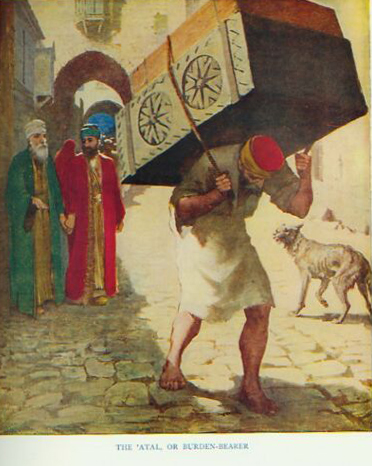
It was from these words that Bunyan, in his “Pilgrim’s Progress,” took the idea of Christian starting out on pilgrimage with an awful burden on his back, making life intolerable. Yet the reader will have noticed that, in most illustrations of this subject, Christian is shown with a small, light bundle strapped to his shoulders, that any strong boy or girl could carry any distance without distress. Different, indeed, was the familiar picture that rose before David, when he felt his spirit wearied and burdened beyond measure by a deep conviction of sin, from which he was powerless to deliver himself, which made life intolerable by its weight, and which, if he fell under it, must kill him.
Our blessed Lord has a plain and even more graphic reference to the toil of the ‘atal, when, speaking of the cruel and oppressive ceremonial traditions forced upon the people, contrary to Scripture, by the hypocritical Scribes and Pharisees, He says that these spiritual taskmasters “bind heavy burdens and grievous to be born, and lay [them] on mens shoulders; but they [themselves] will not move them with their finger.” In beautiful contrast to such wearisome and unscriptural observances, that only tend to bondage and oppression, the Master declares, “My burden is light.” (Matt. 23:4, 11:30)
The snarling mongrel, shown in the picture, well represents the “dog” of Bible lands. With the exception of a few greyhounds, slukee, kept for coursing, and a few shepherds’ dogs, these animals are never individually owned or cared for, but roam the cities and villages in wild packs – huge mongrel curs, many of whom are literally half-bred wolves and jackals. Their very name is one of contempt, and they are only just tolerated because they act as scavengers, devouring by night the offal thrown by the women into the street, and also as night guardians to keep away strangers or wild beasts. They are regarded as vile and unclean, and the ill usage they received drives them out by day into the open country. Then “without are dogs”; but, safe under the cover of darkness, “they return at evening, growling and fighting for the refuse thrown into the road, and ready to fly at all strange comers. (Rev 22:15)
Dogs are never allowed in the houses, never stroked by the master or cared for by the children. When quite young, however, as little puppies, these otherwise hated and ill-used animals are carried indoors, and are fondled and fed by the children, but only when they are quite young. This our Savior well knew, and so did the poor, much tried Syrophoenician fellahh, whose dauntless faith He has called us to admire: to give her hope, though a lowly hope, He said, “It is not proper to take the children’s bread and cast it to little dogs [or ‘puppies,’ kunaria, the diminutive of kuon, ‘a dog’].” To which she replied, as He intended she should, “I beseech Thee, Sir [nai kurie], for even the little dogs [kunaria] eat from the crumbs that are falling from their lords’ table.” It is greatly to be regretted that the translators should have mistranslated this word kunaria, “dogs,” and so made our Lord apply what in the East is regarded as a dreadful epithet to this believing woman, and one which, instead of suggesting a hope for her, as the word He used really did, would have taken all hope away! (Matt 15:22-28)
The two belladeen, or townsmen, known as such by the kumbaz, or kuftan, the rich silk striped tunic, silk scarf girdle, and bright colored cloth cloak, are seen walking along the street hand in hand. Few things in Palestine struck me as stranger than this custom. But I came slowly to realize that it answers exactly to our walking arm in arm. Where we should take a man’s arm, they take his hand. In this case palm is not held to palm, but one grasps with the palm of his right hand the back of the left hand of the other or the fingers of his left hand.
The Scripture references to this custom are most interesting. The angels who appeared in the form of two men, as angels always did, when rescuing Lot and his family from the destruction of Sodom, “Took hold of his hand, and of the hand of his wife, and the hand of his two daughters,” or, as we should say, “gave them their arm,” to lead them gently and persuasively from the scene of judgment. (Gen 19:16)
Observe the inky blackness of the shadows, contrasting so vividly with the exquisitely high sunlight. The shadows form a very striking feature of these Bible lands, and are often alluded to in Scripture as a powerful metaphor for “protection.” To this hour the mass of the people tell the time during daylight by observing the length of their shadow on the ground, and that with astonishing accuracy.
The narrowness and over-arching of the street also speak eloquently of a land of the sun.


